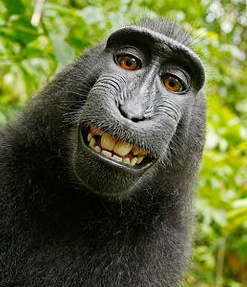Famous monkey ‘selfie’ not copyright, say US authorities
23 Aug 2014
This is the hypothetical question raised by US regulators, who have said in effect that the now famous 'selfie' taken by a monkey that snatched a wildlife photographer's camera cannot be copyrighted, because it wasn't taken through a creative, self-aware process.
 In other words, it was more on account of an accident than smart thinking by the monkey or the photographer, the US copyright office says.
In other words, it was more on account of an accident than smart thinking by the monkey or the photographer, the US copyright office says.
The photograph, clicked by a macaque monkey in Indonesia, went viral; and led to a face-off between Wikipedia, which used it in its open-source common section accessible to the general public, and photographer David Slater, who said the monkey took the picture after swiping his camera during a 2011 expedition in Indonsia, and he therefore owned the copyright (See: Copyright storm as Wikipedia refuses to delete monkey 'selfie').
The monkey evidently was not a party to the dispute and no doubt doesn't even have a clue about the storm it has created in the human world. Otherwise, he may have applied for the copyright himself, with probably a strong case!
The US ruling essentially sided with Wikipedia's argument that the 2011 photograph cannot be copyrighted as it is unprotected intellectual property.
The US copyright office, it its latest 1,222 page compendium, did not directly cite the Wikipedia-Slater spat, but referred indirectly to the episode while explaining what it calls "Human Authorship Requirement." Chapter 300 of the compendium notes that "copyright law only protects 'the fruits of intellectual labour' that 'are founded in the creative powers of the mind'".
The implication is that neither the photographer nor the monkey used any intellectual labour or creative power in this accidental episode, and therefore neither has claims to the copyright. A list of examples cited in the chapter offers some guidelines to future potential spats too to determine if they are creative or accidental.
"The office will not register works produced by nature, animals, or plants. Likewise, the office cannot register a work purportedly created by divine or supernatural beings, although the office may register a work where the application or the deposit copy state that the work was inspired by a divine spirit," said the draft report titled 'Compendium of US Copyright Office Practices, Third Edition.'



















